2019-2020年人教版七年级英语下册单词巧记+句型语法剖析
2019-2020学年人教版英语七年级下册Unit 10 I’d like some noodle
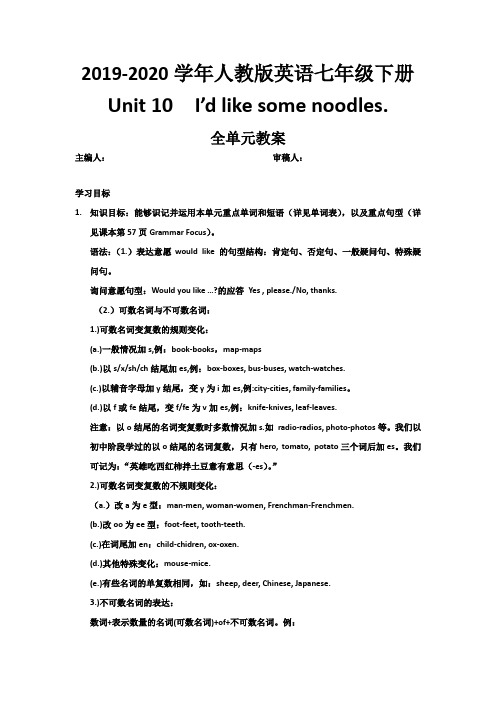
2019-2020学年人教版英语七年级下册Unit 10 I’d like some noodles.全单元教案主编人:审稿人:学习目标1.知识目标:能够识记并运用本单元重点单词和短语(详见单词表),以及重点句型(详见课本第57页Grammar Focus)。
语法:(1.)表达意愿would like 的句型结构:肯定句、否定句、一般疑问句、特殊疑问句。
询问意愿句型:Would you like …?的应答Yes , please./No, thanks.(2.)可数名词与不可数名词:1.)可数名词变复数的规则变化:(a.)一般情况加s,例:book-books,map-maps(b.)以s/x/sh/ch结尾加es,例:box-boxes, bus-buses, watch-watches.(c.)以辅音字母加y结尾,变y为i加es,例:city-cities, family-families。
(d.)以f或fe结尾,变f/fe为v加es,例:knife-knives, leaf-leaves.注意:以o结尾的名词变复数时多数情况加s.如radio-radios, photo-photos等。
我们以初中阶段学过的以o结尾的名词复数,只有hero, tomato, potato三个词后加es。
我们可记为:“英雄吃西红柿拌土豆意有意思(-es)。
”2.)可数名词变复数的不规则变化:(a.)改a为e型:man-men, woman-women, Frenchman-Frenchmen.(b.)改oo为ee型:foot-feet, tooth-teeth.(c.)在词尾加en:child-chidren, ox-oxen.(d.)其他特殊变化:mouse-mice.(e.)有些名词的单复数相同,如:sheep, deer, Chinese, Japanese.3.)不可数名词的表达:数词+表示数量的名词(可数名词)+of+不可数名词。
2020年人教版七年级下册英语各单元知识点总结归纳

2020年人教版七年级下册英语各单元知识点总结归纳2020最新人教版七年级下册英语各单元知识点大归纳Unit 1 Can you play the guitar?◆短语归纳1. play the guitar弹吉他2. play the piano弹钢琴3. play XXX敲鼓4. play chess下象棋5. XXX说英语6. speak a little English说一点英语7. say it in English用英语说它8. join the art club加入艺术俱乐部9. XXX XXX加入篮球俱乐部10. join XXX加入游泳俱乐部11. what XXX什么俱乐部12. play the guitar well弹吉他弹得好13. be good with sb和某人相处的好14. be good for···对······有益处◆用法集萃1. play +棋类/球类下……棋,打……球2. play the +西洋乐器弹/拉……乐器3. be XXX.善于做某事4. be good with sb.和某人相处地好5. need sb. to do sth.需要某人做某事◆语法can能;会;能够【用法】它本身有一定的含义,没有人称和数的变化,但不能单独作谓语,要和动词原形一起构成谓语。
6. can +动词原形能/会做某事7. a little +不可数名词一点儿……8. join the …club加入…俱乐部9. like to do sth.=love to do sth.喜欢/喜爱做某事10. want sb. to do XXX想要某人做某事15. be good at···擅长······16. help sb with sth / doing XXX帮助某人干某事17. help kids with XXX匡助孩子们游泳18. do XXX表演中国功夫19. be in参加,加入20.call sb at +电话号码给某人打电话拨打···号21.have an e-mail address有电子邮件的地点22.a little一点(后接不成数名词)23.in the music room在音乐课堂里24.show sth to sb = show sb sth把某物给或人看25.XXX在周末1(1)表示能力,意为“能;会”,表示客观上具有某种能力。
2019-2020年人教版英语七年级下册Unit 1 Can you play the guitar

2019-2020学年人教版英语七年级下册七年级下册Unit 1 Can you play the guitar?单元知识点一.词汇。
二.词汇分析。
1.play 玩动词---- player 名词1)玩球类球类前不加定冠词“the”Eg. play basketball/baseball/football/soccer/volleyball扩展:basketball player, baseball player, football player, soccer player, volleyball player2)玩棋类棋类前不加定冠词“the”Eg. play chess play cards3)玩乐器乐器前必须加定冠词“the”Eg. play the guitar play the drums play the piano play the violin4)和人一起玩用介词with, play with sb.2.join 参加1)join 为及物动词,直接加宾语。
Eg. join the party join the game join the club2)club 俱乐部不同俱乐部的表达:the swimming club 游泳俱乐部the dancing club 舞蹈俱乐部the story telling club 讲故事俱乐部the music club 音乐俱乐部the art club 美术俱乐部the English club 英语俱乐部the chess club 象棋俱乐部the sports club 体育俱乐部3.tell 告诉1)讲故事tell story --- story telling club2)tell sb to do sth 让某人做某事Eg. The teacher tells me to tell a story.拓展:ask sb to do sth4.make 动词使成为,制造1)make sb do sth 使得某人做某事(加动词原形)Eg. My mother makes me learn to play chess.2)make sb adj 使得某人怎样(加形容词)Eg. The students make the teacher angry.3)固定短语:make friends 结交朋友make mistakes 犯错误5.help 帮助1)help sb with sth 帮助某人某事(加名词用介词with)EG. I often help my mother with the housework.2)help sb (to) do sth 帮助某人做某人(可以加动词不定词或者动词原形)Eg. I can help my mother (to) do the housework.6.talk 说话,交谈1)talk to sb 跟...说Eg. He is talking to the teacher.2)talk with sb 跟....交谈Eg. I want to talk with the teacher.3)当名词have a talk with sbEg. I want to have a talk with the teacher.7.speak 说,讲通常指能说什么语言Eg. Speak English Speak Chinese8.teach 教,讲授第三人称单数+“es”1)teach oneself 自学Eg. I teach myself the piano.2)teach sb sth 教某人某事Eg. Mr. Li teaches us English.9.people 人,人们people 没有复数形式Eg. How many people are there in your family?10.home1)名词,家at home 在家Eg. I am at home .2)副词,到家,在家go home11.weekend 周末1)on the weekend 在周末eg. I help my mother do the housework on the weekend.2)on weekends 周末(不止一个周末)12.today 今天yesterday 昨天tomorrow 明天the day before yesterday 前天the day after tomorrow 后天13.also 与too1)also 也,放在句中2)too 也,放在句末,通常前面有逗号Eg. I am also a basketball player. = I am a basketball player, too.14.be good at , be good with , be good for1)be good at 擅长于加名词或者动名词Eg. I am good at playing basketball.I am good at violin.2)be good with 善于应付.....的,对.....有办法的Eg. I am good with little kids.3)be good for 对......有益Eg. Fresh air is good for us.三.语法分析---情态动词can的用法。
2019-2020年人教版英语七年级下册Unit6 I'm watching TV单元知识点(含习题
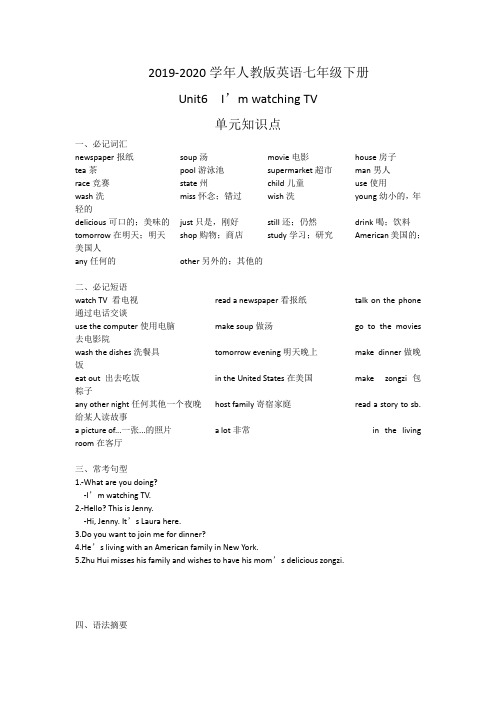
2019-2020学年人教版英语七年级下册Unit6 I’m watching TV单元知识点一、必记词汇newspaper报纸soup汤movie电影house房子tea茶pool游泳池supermarket超市man男人race竞赛state州child儿童use使用wash洗miss怀念;错过wish洗young幼小的,年轻的delicious可口的;美味的just只是,刚好still还;仍然drink喝;饮料tomorrow在明天;明天shop购物;商店study学习;研究American美国的;美国人any任何的other另外的;其他的二、必记短语watch TV 看电视read a newspaper看报纸talk on the phone 通过电话交谈use the computer使用电脑make soup做汤go to the movies 去电影院wash the dishes洗餐具tomorrow evening明天晚上make dinner做晚饭eat out 出去吃饭in the United States在美国make zongzi包粽子any other night任何其他一个夜晚host family寄宿家庭read a story to sb.给某人读故事a picture of...一张...的照片 a lot非常in the living room在客厅三、常考句型1.-What are you doing?-I’m watching TV.2.-Hello? This is Jenny.-Hi, Jenny. It’s Laura here.3.Do you want to join me for dinner?4.He’s living with an American family in New York.5.Zhu Hui misses his family and wishes to have his mom’s delicious zongzi.四、语法摘要重点:现在进行时的定义、结构、标志词及动词ing形式的变化规则。
人教版英语七年级下册第九单元短语语法知识点总结
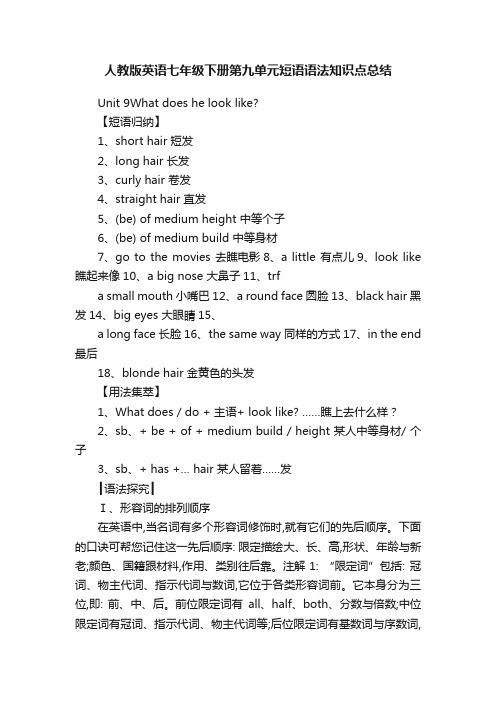
人教版英语七年级下册第九单元短语语法知识点总结Unit 9What does he look like?【短语归纳】1、short hair 短发2、long hair 长发3、curly hair 卷发4、straight hair 直发5、(be) of medium height 中等个子6、(be) of medium build 中等身材7、go to the movies 去瞧电影8、a little 有点儿9、look like 瞧起来像10、a big nose 大鼻子11、trfa small mouth 小嘴巴12、a round face 圆脸13、black hair 黑发14、big eyes 大眼睛15、a long face 长脸16、the same way 同样的方式17、in the end 最后18、blonde hair 金黄色的头发【用法集萃】1、What does / do + 主语+ look l ike? ……瞧上去什么样?2、sb、+ be + of + medium build / height 某人中等身材/ 个子3、sb、+ has +… hair 某人留着……发┃语法探究┃Ⅰ、形容词的排列顺序在英语中,当名词有多个形容词修饰时,就有它们的先后顺序。
下面的口诀可帮您记住这一先后顺序: 限定描绘大、长、高,形状、年龄与新老;颜色、国籍跟材料,作用、类别往后靠。
注解1: “限定词”包括: 冠词、物主代词、指示代词与数词,它位于各类形容词前。
它本身分为三位,即: 前、中、后。
前位限定词有all、half、both、分数与倍数;中位限定词有冠词、指示代词、物主代词等;后位限定词有基数词与序数词,但序数词位于基数词前。
如: both my hands; all his income、注解2: “描绘”性形容词。
如: beautiful、bad、cold、great等。
人教版七年级英语下册 重点短语及句型汇总
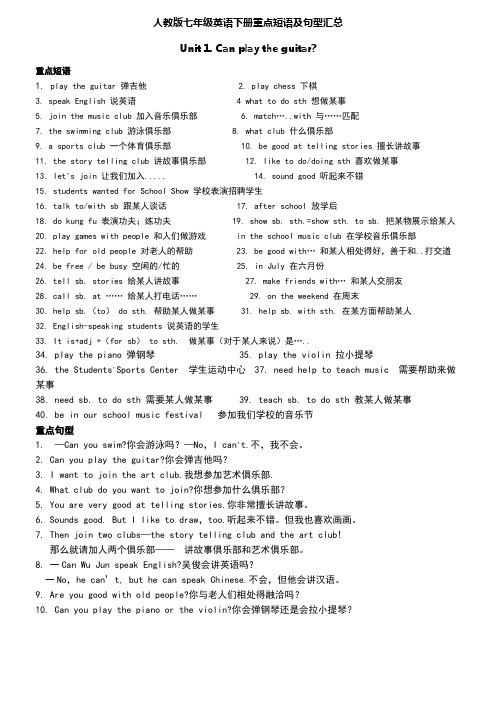
人教版七年级英语下册重点短语及句型汇总Unit 1. Can play the guitar?重点短语1.play the guitar 弹吉他2. play chess 下棋3. speak English 说英语 4 what to do sth 想做某事5. join the music club 加入音乐俱乐部6. match…..with 与……匹配7. the swimming club 游泳俱乐部 8. what club 什么俱乐部9. a sports club 一个体育俱乐部 10. be good at telling stories 擅长讲故事11. the story telling club 讲故事俱乐部 12. like to do/doing sth 喜欢做某事13. let's join 让我们加入..... 14. sound good 听起来不错15. students wanted for School Show 学校表演招聘学生16. talk to/with sb 跟某人谈话 17. after school 放学后18. do kung fu 表演功夫;练功夫 19. show sb. sth.=show sth. to sb. 把某物展示给某人20. play games with people 和人们做游戏 in the school music club 在学校音乐俱乐部22. help for old people 对老人的帮助 23. be good with…和某人相处得好,善于和..打交道24. be free / be busy 空闲的/忙的 25. in July 在六月份26. tell sb. stories 给某人讲故事 27. make friends with…和某人交朋友28. call sb. at ……给某人打电话…… 29. on the weekend 在周末30. help sb.(to) do sth. 帮助某人做某事 31. help sb. with sth. 在某方面帮助某人32. English-speaking students 说英语的学生33. It is+adj +(for sb) to sth. 做某事(对于某人来说)是…..34. play the piano 弹钢琴 35. play the violin 拉小提琴36. the Students'Sports Center 学生运动中心37. need help to teach music 需要帮助来做某事38. need sb. to do sth 需要某人做某事 39. teach sb. to do sth 教某人做某事40. be in our school music festival 参加我们学校的音乐节重点句型1. —Can you swim?你会游泳吗?—No,I can't.不,我不会。
2019-2020年人教版英语七年级下册Unit4Don’teatinclass单元
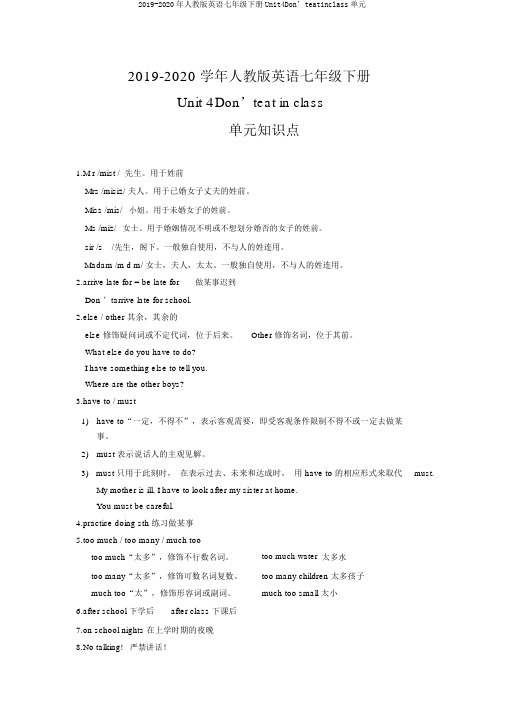
2019-2020 学年人教版英语七年级下册Unit 4Don’teat in class单元知识点1.M r /mist / 先生。
用于姓前Mrs /misiz/ 夫人。
用于已婚女子丈夫的姓前。
Miss /mis/小姐。
用于未婚女子的姓前。
Ms /miz/女士。
用于婚姻情况不明或不想划分婚否的女子的姓前。
sir /s /先生,阁下。
一般独自使用,不与人的姓连用。
Madam /m d m/ 女士,夫人,太太。
一般独自使用,不与人的姓连用。
2.arrive late for = be late for做某事迟到Don ’tarrive late for school.2.else / other 其余,其余的else 修饰疑问词或不定代词,位于后来。
Other 修饰名词,位于其前。
What else do you have to do?I have something else to tell you.Where are the other boys?3.have to / must1)have to“一定,不得不”,表示客观需要,即受客观条件限制不得不或一定去做某事。
2)must 表示说话人的主观见解。
3) must 只用于此刻时,在表示过去、未来和达成时,用 have to 的相应形式来取代must.My mother is ill, I have to look after my sister at home.You must be careful.4.practice doing sth 练习做某事5.too much / too many / much tootoo much“太多”,修饰不行数名词。
too much water 太多水too many“太多”,修饰可数名词复数。
much too“太”,修饰形容词或副词。
6.after school 下学后after class 下课后too many children 太多孩子much too small 太小7.on school nights 在上学时期的夜晚8.No talking!严禁讲话!No+ 名或名,表示严禁、不要做某事。
2019-2020年人教版英语七年级下册Unit 8 Is there a post office

Unit 8 Is there a post office near here?Section A(1a-2d)【热身小测】5分钟Ⅰ. 根据句意及图片提示从方框中选择适当的介词填空to, between, on, from1. The pay phone is across the library.2. The pay phone is next the library.3. The pay phone is the post office and the library.4. The pay phone is Green Street.答案: 1. from 2. to 3. between 4. onⅡ. 情景交际1. — a hospital near here?—Yes, there is. on Bridge Street.2. —the hospital?—It’s next to the police station.答案: 1. Is there; It’s 2. Where’s【基础达标】15分钟Ⅰ. 根据句意及首字母或音标提示完成单词(5分)1. There are many kinds of books in the l .2. He lives n to the park.3. —Where is Mr. Li?—He may be working in the o .4. You need to 50 yuan for the ticket.5. —Where is my hat? I can’t see it.—Oh, it’s the door.答案: 1. library 2. next 3. office 4. pay 5. behindⅡ. 从方框中选择合适的单词完成句子(5分)restaurant, hospital, town, between, bank1. We can get money from a .2. Lin Ping’s sister is ill. She must go to see a doctor in a.3. Look! The park is the hotel and the bookstore.4. Excuse me. I’m new in. How can I find a food shop near here?5. If you want to eat something, you can go to a .答案: 1. bank 2. hospital 3. between 4. town 5. restaurantⅢ. 完成句子, 每空一词(5分)1. (在公园对面), there is a bank.1. Across from the park2. —Is there a park near here?—Yes, there is. It’s(在……前面)the police station.2. in front of3. —? (我能为你做点什么呢? )—I can’t find a restaurant.3. How can I help you4. I often (和……一起散步)my mother after supper.4. walk with5. The bank is (离……不远)the hospital.5. not far from答案: 1. Across from the park 2. in front of 3. How can I help you 4. walk with 5. not far fromⅣ. 单项选择(5分)1. —is the pay phone?—It’s behind the shop.A. WhenB. WhereC. WhatD. How【解析】选B。
- 1、下载文档前请自行甄别文档内容的完整性,平台不提供额外的编辑、内容补充、找答案等附加服务。
- 2、"仅部分预览"的文档,不可在线预览部分如存在完整性等问题,可反馈申请退款(可完整预览的文档不适用该条件!)。
- 3、如文档侵犯您的权益,请联系客服反馈,我们会尽快为您处理(人工客服工作时间:9:00-18:30)。
七年级下册单词巧记+句型语法剖析Unit 2 What time do you go to school三点剖析单词·巧记·典句·考点【巧记提示】 show(展览)+er(名词后缀)【经典例句】 He likes to take a cold shower in the morning.他喜欢早晨洗冷水澡。
【考点聚焦】 1)常用搭配:take a shower=have a shower 洗澡2)shower 还可意为“展出者”“阵雨”等。
【巧记提示】 usual(平常,通常的)+ly(副词后缀)【经典例句】 The boy is usually late for school.这个男孩经常上学迟到。
【考点聚焦】 usually为副词,意为“经常;通常”,表示频率。
一般用于实义动词之前,系动词、情态动词、助动词的后面。
【活学活用】 1.用usual的适当形式填空—What time do you get up on Sunday?—I get up at half past seven as .Suspense in news is torture.难辨消息的真假,对人是一种折磨。
答案:usually,usual【巧记提示】 work(工作)→word(单词)【经典例句】 I have a lot of work to do.我有许多工作要做。
【考点聚焦】 1)注意work可作动词,也可用作名词。
注意用作名词时与job的区别:work多指生产或完成某物的体力的或脑力的努力或活动,是不可数名词。
job多指为换取报酬而进行的日常活动,尤指作为职业的工作,是可数名词。
2)派生词:worker n. 工人works n. 著作,作品3)常用搭配:at work在工作;work out计算出;work at/on 从事于我的记忆卡【活学活用】 2.用work的适当形式填空My father is a .He in a factory(工厂).答案:worker,works【巧记提示】 h+our(我们的)【经典例句】 She will be back home in an hour.她一小时后回家。
【考点聚焦】 1)注意hour的读音,在单词中h不发音,因此前面要用an,而不能用a。
2)常用搭配:half an hour半小时;hour by/afterhour一个小时接着一个小时。
【活学活用】 3.冠词填空There are sixty minutes in hour.答案:an【巧记提示】 b(形如牙刷)+rush(冲)【经典例句】 Brush your teeth every morning.每天早晨要刷牙。
【考点聚焦】 brush也可用作名词,意为“刷子,擦子”。
【活学活用】 4.组成句子shoes,you,your,can,brush,to brush,this,use答案:You can use this brush to brush your shoes.【经典例句】 He is old,but he has all his own teeth.他虽然老了,但牙齿好。
【考点聚焦】 1)tooth的复数形式为teeth。
2)常用搭配:brush one’s teeth 刷牙【巧记提示】 all(都)→tall(高)【经典例句】 All roads lead to Rome.条条道路通罗马。
【考点聚焦】 1)作副词,通常指“(三者或三者以上的)都”,一般用于实义动词之前,系动词、情态动词、助动词的后面。
作代词,意为“全部,全体”,后面可跟of短语,也可跟同位语。
2)固定搭配:after all毕竟,终究all over到处,遍及all right 好,可以That’s all就这些not...at all根本不【巧记提示】 l(像数字1)+is(是)+ten(十)【经典例句】 Tom often listens to the radio in the morning.早晨Tom经常听收音机。
【考点聚焦】注意listen与hear的区别:①hear意为“听,听见”,强调听的能力和结果。
可作及物动词或不及物动词。
②listen 强调“听”的动作,它是不及物动词,若后跟宾语时,要加to,构成listen tosth.“听……”。
【活学活用】 5.用listen,hear填空—!What can you in the classroom?—Nothing.答案:Listen,hear【巧记提示】 after(在……之后)+noon(中午)【经典例句】 What are you going to do this afternoon?今下午你打算干什么?【考点聚焦】注意“在下午”常用in the afternoon;而在具体的某天的上午、下午或晚上要用on。
如:onthe afternoon of May 1st 在5月1日的下午。
on Saturday afternoon在周六下午。
【活学活用】 6.改错In the afternoon,I do homework.But in thisafternoon ,I play volleyball.AB C答案: B→this afternoon【巧记提示】 a(一个)+round(圆)【经典例句】 His father gives him around a million pounds.他父亲给了他大约100万英镑。
【考点聚焦】 1)同义词:about prep.大约2)around还可意为“在周围,在附近”。
【活学活用】 7.完成同义句My mother gets home at around five thirty.My mother gets home at five thirty.答案:about【巧记提示】 wish(祝愿)→fish(鱼儿)Speech is silver,but silence is gold.说话是银,但沉默是金。
【经典例句】 The fairy granted him three wishes.那个仙子允许他表达三个心愿。
【考点聚焦】 1)wish作动词时,表示希望、美好的祝愿,通常接动词不定式。
2)作名词时,表示祝愿,在祝愿语句中常用复数。
短语·典句·考点get up 起床【经典例句】It’s time to get up.到该起床的时间了。
【考点聚焦】注意与get构成的词组:get on上车;get off下车;get back取回,拿回;get to到达【活学活用】 8.汉译英1)你妈妈经常在几点钟起床?2)当你到达北京后,请给我打电话。
答案:1)When does your mother usually get up?2)When you get to Beijing,please callme.do one’s homework 做作业【经典例句】 He often does his homework at home.他经常在家里做作业。
【考点聚焦】one’s相当于形容词性物主代词,意思是“某人的”。
要随着主语的变化而变动。
【活学活用】 9.用所给词的适当形式填空1)I must do (me)homework after school.2)Look!Lucy is doing (she)homework at home.答案:1)my 2)hergo to school 去上学【经典例句】Let’s go to school together.咱们一起去上学吧!【考点聚焦】 1)注意下面的词组:go to bed上床睡觉;go to work去上班;go home回家2)“go to+名词”意为“去……”。
后面接副词时,to须省略。
【活学活用】 10.翻译下面的词组1)去上学2)上床睡觉3)去那里4)去上班答案:1)go to school 2)go to bed 3)go there4)go to workat eight o’clock 在八点钟【经典例句】I often get up at eight o’clock.我经常八点钟起床。
【考点聚焦】注意in,at,on在时间名词前的用法区别:①表示“在年、月、日等较长时间内”用in,泛指“在早晨、下午或晚上”也用in。
②表示具体的某一天及其上、下午等,要用on。
③在具体的时刻的前面要用at。
句子·剖析·拓展What a funny time to eat breakfast!吃早餐的时间可真有趣!【剖析】这是一句感叹句,句尾用感叹号。
what在此是形容词,意为“多么”。
句子结构为:What+(a/an)+形容词+名词+主语+谓语!【拓展】 how也可引导感叹句,结构为:How+形容词/副词+主语+谓语!To get to work,he takes the number 17 bus to a hotel.为了上班,他乘17路公共汽车到一家酒店。
【剖析】 to get to work为不定式短语,在这里作目的状语。
不定式短语作状语时,也可以放在句子的后面。
Can you think what his job is?你能想像他的职业吗?【剖析】此句是一个宾语从句,主句是can you think,后面是what引导的从句,用来作宾语。
【拓展】在宾语从句中,从句必须是陈述句的语序。
如:I don’t know what his name is.我不知道他叫什么名字。
该句不能说成:I don’t know what is his name.语法·聚焦time大搜索【链接一】询问时间的句型What’s the time,please?或What time is it,please?是询问时间的常用句型,回答时用:It is+具体时间。
【链接二】 what time或when碰碰车问“在什么时候?”,可用what time 或when,其中when比what time范围广,what time指具体的“几点几分”。
【链接三】时刻的表达法1.整点法时间刚好是整点,可用“基数词+o’clock”表示。
o’clock也可省略。
如:9:00→at nine或at nine o’clock2.非整点法A.顺读法:即按照“先时后分”的顺序,都用基数词读出。
如:4:20→four twentyB.逆读法:即借助介词past 或to,按照“先分后时”的顺序表达。
当分钟数<30时,用“分钟数+past+钟点数”表示。
如:8:05→five past eight当分钟数=30时,用“half+past+钟点数”表示。
